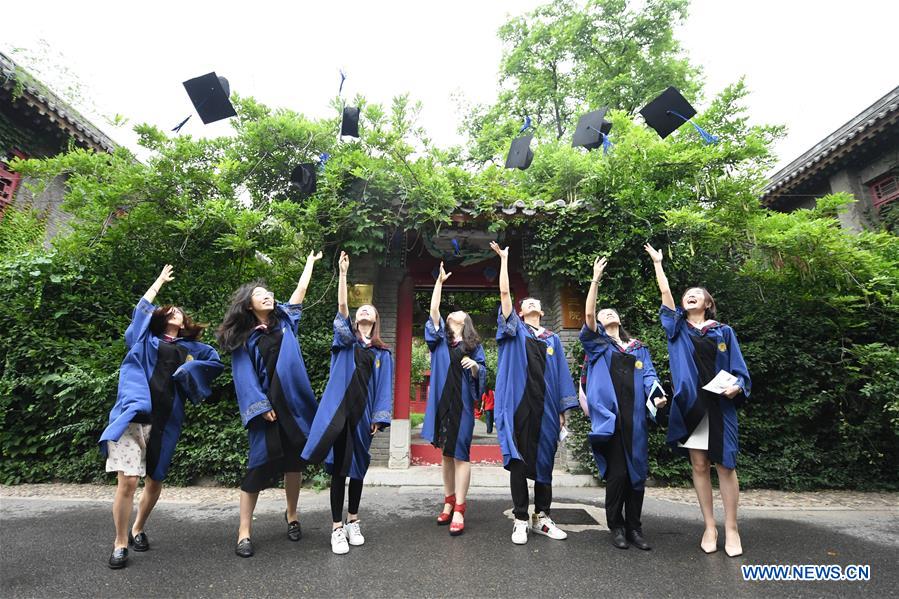Changes in general education curriculum in Chinese universities
- By Mathew Wong
 0 Comment(s)
0 Comment(s) Print
Print E-mail China.org.cn, July 12, 2020
E-mail China.org.cn, July 12, 2020

The general education (GE) curriculum movement originating in the United States is only now taking center stage in undergraduate education in China, becoming a mandatory graduation requirement and a core component of the country's university education system.
The Outline of China's National Plan for Medium-Term and Long-Term Education Reform and Development (2010-2020) identified the overarching goal of utilizing general education to promote all-round student development. The Ministry of Education seeks to eliminate barriers across various knowledge disciplines, so that the mutual foundational interconnected nature of human knowledge and learning can become more explicit.
The broadening of GE curriculum varies with the institutions involved, given their own mission, history, culture, educational objectives, and future development plans. Nonetheless, they are all offering broader and deeper learning experience, highlighting the appreciation of diverse cultures, advocating active community involvement, and underscoring the significance of whole-person development.
An example is the liberal arts core curriculum in Shanghai's Fudan University. Its comprehensive curriculum is made up of six knowledge modules, covering humanities and cultural heritage, philosophy and critical thinking, cultural dialogue and world vision, scientific spirit and scientific exploration, ecology and biological conservation, as well as artistic creativity and aesthetic experience.
All students need to take at least one course right across the six knowledge modules. Under the coordination of the Liberal Arts Core Curriculum Office, more than 200 courses are grouped into around 50 basic course units allowing students to see how they are systematically connected and intertwined.
The Principal Leader System is in place to allow every teaching team to optimize the course. Each course is supported by one to two Master or PhD students as tutors.
The implied function of general education is empowering students to have more discretion in selecting various academic domains upon admission. Originally, they were locked into an increasingly specialized and professionalized academic program with strict and specific paths, limiting their capabilities and opportunities for more individual interests, career choices or even further study.
Many of the GE courses are designed based on the broad array of current faculty interests and available academic resources; meanwhile, academics are able to build on their discipline-field expertise, and offer interdisciplinary teaching and learning. Therefore, the emphasis of both substance and method allows genuine integration and intersection of disciplines.
Involved in a fast-changing world of economic development and technological advancement, undergraduates are expected to acquire relevant dispositions and transferable skills so as to become competent human capital sustaining the globalization of the knowledge economy. The GE curriculum also prepares students to enhance their cooperation and collaboration, interpersonal communication, critical and independent thinking, and problem-solving skills.
These lifelong learning traits are essential for graduates entering a constantly changing job market, especially when the specialized knowledge is becoming of less importance and value. Meeting human resource needs in the competitive globalized marketplace through contemporary higher education system is paramount.
In China, the 11th Five-Year Plan (2006-2010) called for the emergence of an innovative society, with heavy and repeated usage of terminologies like "independent innovation" and "abundant human capital" to illustrate the nation's development directions.
For lectures emphasizing directional instruction, academics will equip students with the skills to comprehend the philosophical basics, underlying assumptions and fundamental methods across various knowledge disciplines. For tutorials that focus more on inquiry-based learning, experienced tutors will help students to actively and independently develop their own conclusions and conceptions.
A more dynamic and interactive classroom learning experience is always expected among the current generation of students as they become less tolerant of sitting quietly and listening. Meanwhile, through collaborative works and discussions, students are compelled to justify their own positions and engage with different perspectives of their classmates. The main focus is always about enhancing high-order core competencies like reflection, evaluation, and creation.
Nonetheless, the expansion of general education becomes more challenging within every institution under the constraints of disciplinary divisions, and inadequate cooperation across departments. Meanwhile, both publication pressures and grants applications are compelling academics to spend less time to go over their various areas of knowledge and explore the meaning of general education.
Each institution also needs to cater to student needs thoroughly in defining the scope and targets of GE courses. Moreover, although substantial efforts have been devoted to promotion, the curriculum seems to have been supported more in theory more than in practice. Every institution should develop more structures and incentives to facilitate ongoing intersections of those diverse disciplines, and within the broad academic community and society.
In higher education, the introduction or re-emergence of general education undeniably represents a transformative shift from specialized academic training to holistic educational experience. It is all about individual enrichment in a rapidly evolving world, and rejuvenation of general education corroborates further development and societal progress.
Mathew Wong is an assistant professor in the Department of Social Sciences at the Education University of Hong Kong.
Opinion articles reflect the views of their authors only, not necessarily those of China.org.cn.
If you would like to contribute, please contact us at opinion@china.org.cn.






Go to Forum >>0 Comment(s)